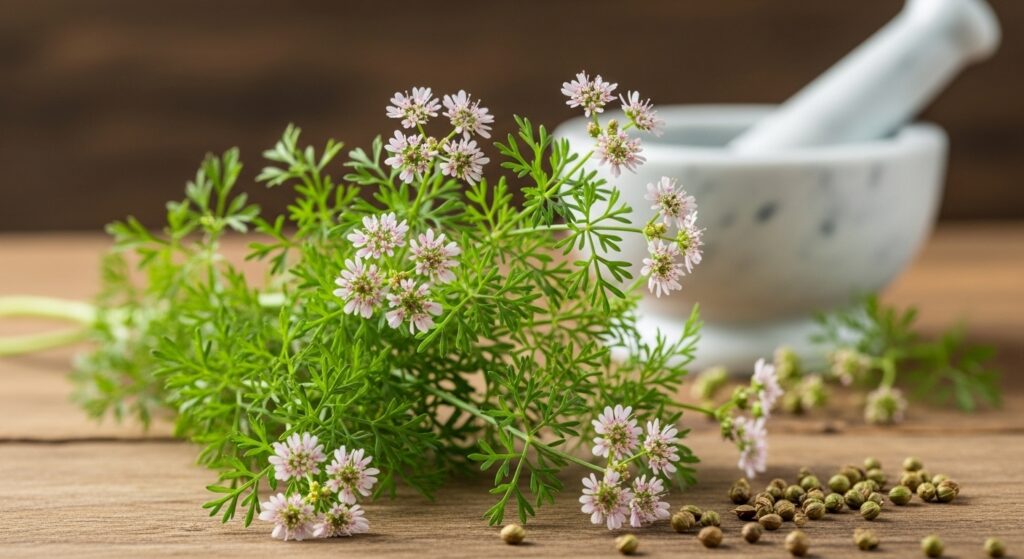Koriandri, often known as coriander in the culinary world, is more than just a flavorful herb that can elevate your favorite dishes. This vibrant green plant is packed with history and health benefits that span centuries and cultures. From its tantalizing aroma to its potent healing properties, Koriandri has earned its place not only on our plates but also in traditional medicine cabinets worldwide. Whether you’re a seasoned chef or someone curious about natural remedies, discovering the wonders of Koriandri could add a new dimension to your cooking and wellness practices. Let’s dive into this remarkable herb and uncover what makes it so special!
History and Origins of Koriandri
Koriandri, commonly known as coriander or cilantro, boasts a rich history that dates back thousands of years. Its origins trace back to the Mediterranean and parts of Asia, where it was cultivated for culinary and medicinal purposes.
Ancient Egyptians revered koriandri, using it in their embalming practices. This fragrant herb is also mentioned in biblical texts, highlighting its significance across cultures.
In India, koriandri has been a staple for millennia. It plays a vital role in traditional dishes and Ayurvedic medicine. The seeds have been found in archaeological sites dating as far back as 2000 BC.
Today, koriandri is celebrated worldwide. Its versatility transcends borders by enriching diverse cuisines—from Mexican salsas to Thai curries—making it an essential ingredient on global tables.
Nutritional Benefits of Koriandri
Koriandri, commonly known as coriander or cilantro, is more than just a flavorful herb. It boasts an impressive nutritional profile that contributes to overall health.
Packed with vitamins A, C, and K, koriandri supports immune function and skin health. Its rich antioxidant content helps combat oxidative stress in the body.
Minerals like potassium and manganese found in koriandri are essential for maintaining proper bodily functions. These nutrients aid in regulating blood pressure and support bone health.
Additionally, this herb provides dietary fiber, promoting digestive wellness. Incorporating koriandri into meals not only enhances flavor but also adds significant nutritional value to your dishes.
Whether sprinkled fresh over salads or blended into sauces, koriandri delivers both taste and nourishment effortlessly.
Medicinal Uses and Healing Properties
Koriandri, also known as cilantro or coriander, boasts a rich array of medicinal uses. Its leaves and seeds have been utilized in traditional medicine for centuries.
One notable benefit is its ability to aid digestion. Koriandri can help soothe an upset stomach and alleviate bloating. It stimulates the production of digestive enzymes.
The herb is also celebrated for its anti-inflammatory properties. This makes it a natural remedy for conditions like arthritis. Koriandri may reduce swelling and discomfort in joints.
Additionally, studies suggest that koriandri might play a role in lowering blood sugar levels. This effect can be particularly beneficial for individuals managing diabetes.
Furthermore, this flavorful herb has antimicrobial qualities that combat harmful bacteria and fungi. Incorporating koriandri into your meals not only enhances flavor but supports overall health as well.
How to Incorporate Koriandri into Your Diet
Incorporating koriandri into your meals is both easy and delicious. Fresh leaves can be used as a vibrant garnish, adding color and flavor to dishes like soups or salads.
Chop up the fresh herb and mix it into salsa for an extra kick. It pairs wonderfully with tomatoes and avocados. You can also add dried koriandri seeds during cooking for a warm, earthy note in stews or curries.
For breakfast enthusiasts, try blending coriander leaves into smoothies for a refreshing twist. This herbal addition not only enhances taste but also boosts nutrition.
Experimenting with koriandri in marinades can elevate grilled meats or vegetables. A simple marinade of olive oil, garlic, and chopped coriander will transform any dish.
Don’t forget about its role in teas! Steep fresh or dried leaves to enjoy a soothing beverage that supports digestion while tantalizing your taste buds.
Potential Precautions and Side Effects of Koriandri
While Koriandri offers many benefits, it’s essential to be aware of potential precautions and side effects. Some individuals may experience allergic reactions, especially those sensitive to related plants like carrots or celery.
If you’re pregnant or breastfeeding, consult a healthcare professional before adding Koriandri to your diet. Its effects on pregnancy are not well-studied, so caution is advised.
High doses can lead to gastrointestinal discomfort in some people. Symptoms might include nausea or diarrhea, particularly if consumed excessively.
Always start with small amounts when incorporating this herb into your meals. Monitoring how your body reacts is crucial for determining tolerance levels.
As with any herb or supplement, it’s wise to speak with a doctor if you have underlying health conditions or are taking medications that could interact negatively with Koriandri.
Conclusion: Embrace the Power of Koriandri in Your Health Journey
Koriandri is more than just a flavorful herb. Its rich history and impressive nutritional profile make it a valuable addition to any kitchen. Whether you’re looking for ways to enhance your dishes or boost your health, Koriandri offers numerous benefits.
Incorporating this herb into your diet can be simple and enjoyable. From fresh leaves in salads to dried seeds in marinades, the possibilities are endless. Remember, moderation is key, especially if you’re new to using this herb.
As you explore Koriandri’s unique flavor and medicinal properties, consider how it can complement your overall well-being. Don’t shy away from experimenting with recipes that feature this powerful herb; you might discover a new favorite dish along the way.







